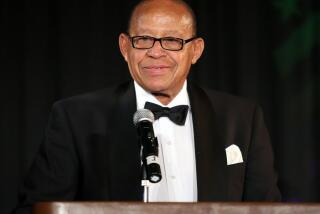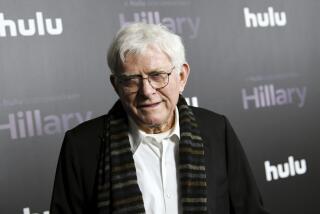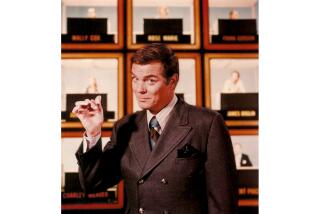Ray Hubbard; TV Broadcaster Focused on Social Change
- Share via
Ray Hubbard, a pioneering television producer and broadcasting executive who believed the medium should be an engine for social change, has died in a Sonoma, Calif., hospital. He was 75.
Hubbard, who lived in nearby Kenwood, died Dec. 27 after suffering from Parkinson’s disease for 20 years, said his son Stephen, of Pasadena.
As vice president for programming and production at Washington Post-Newsweek Stations Inc. in Washington, D.C., from 1969 to 1976, Hubbard created the 1976 “American Documents” series, a 13-part bicentennial look at the country’s history and culture. He also hired the first black anchors for a local news show in a city then 85% black, which led to death threats from the Ku Klux Klan.
Hubbard became known for promoting educational programs for children and socially conscious programs for previously ignored segments of the population. Among them were “Harambee,” which focused on black culture, and “Everywoman,” aimed at women. He was also one of the first to program classic movies, creating “Cinema Club 9” in Washington in 1971.
Hubbard loved movies and in 1981 published a novel, “Majestic,” about Hollywood’s golden age.
Among his most recent television specials were a series of four programs--”Castle,” “Cathedral,” “Pyramid” and “Roman City”--produced through his nonprofit Unicorn Projects Inc. and funded by the National Endowment for the Humanities. The series was based on the work of author-illustrator David Macaulay, who hosted the programs. “Roman City” won the national prime-time Emmy as the outstanding animated program of 1994.
Born in Los Angeles, Hubbard earned a bachelor’s degree at the California College of Arts and Crafts in Oakland and a master’s in theater and communications at Stanford. He began his career teaching art at Sequoia High School in Redwood City, Calif.
Hubbard moved into broadcasting in 1951 as art director and production manager for KPIX, a Group W station in San Francisco. In the late 1950s, he spent two years at Boston’s WBZ, where he produced the innovative “In the Shadow of a City,” a documentary showing inner-city decay and racism outside the South.
Returning to KPIX in 1958 as program director, he continued his crusade for social change, hiring the first female news anchor there, televising the first on-air editorial inviting viewers’ on-camera response and producing a documentary, “The Innocent Fair,” that was credited with saving San Francisco’s crumbling Palace of Fine Arts from demolition.
Hubbard was dedicated to educational programming throughout his life. At KPIX he offered a “Discovery” series on contemporary art in connection with the San Francisco Museum of Art; the series “Black Culture” in cooperation with Morgan State University in Baltimore; the series “Children’s Spectaculars” with such performers as Boris Karloff and Steve Allen; and “The Reading Show,” in which children read actors’ dialogue. He was also innovative in televising lung and heart surgeries.
Hubbard served as national programming manager and public affairs executive producer for Westinghouse’s Group W, based in New York City, before going to Washington in 1969.
During his long career, Hubbard received virtually every major television award including the Emmy, the DuPont and the Peabody, along with special honors from the Freedom Foundation, the National Conference of Christians and Jews, and Action for Children’s Television.
Survivors include his wife of 49 years, Marion; three sons, Stephen and Bruce of Pasadena and Gregory of Wells, Maine; and two grandchildren.
More to Read
The complete guide to home viewing
Get Screen Gab for everything about the TV shows and streaming movies everyone’s talking about.
You may occasionally receive promotional content from the Los Angeles Times.






